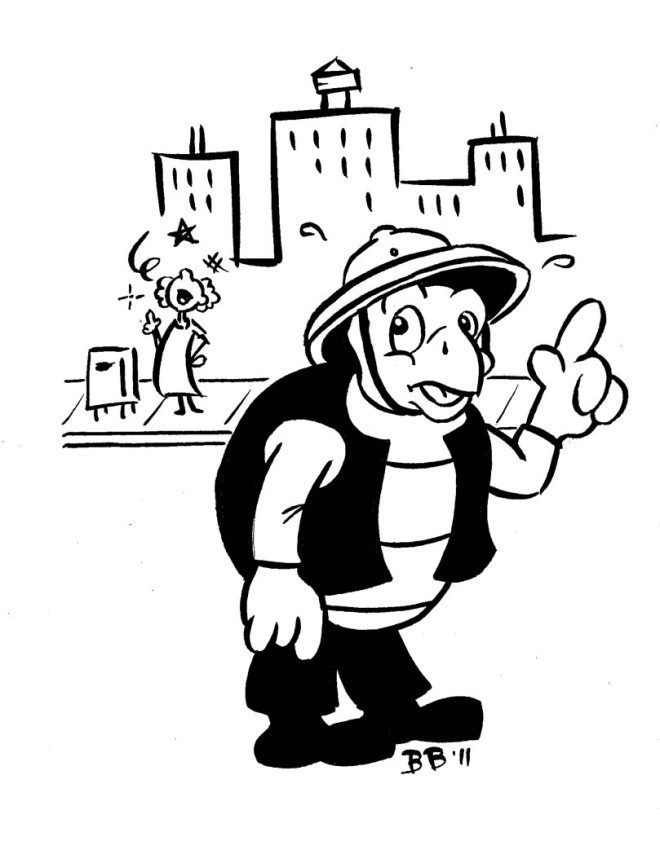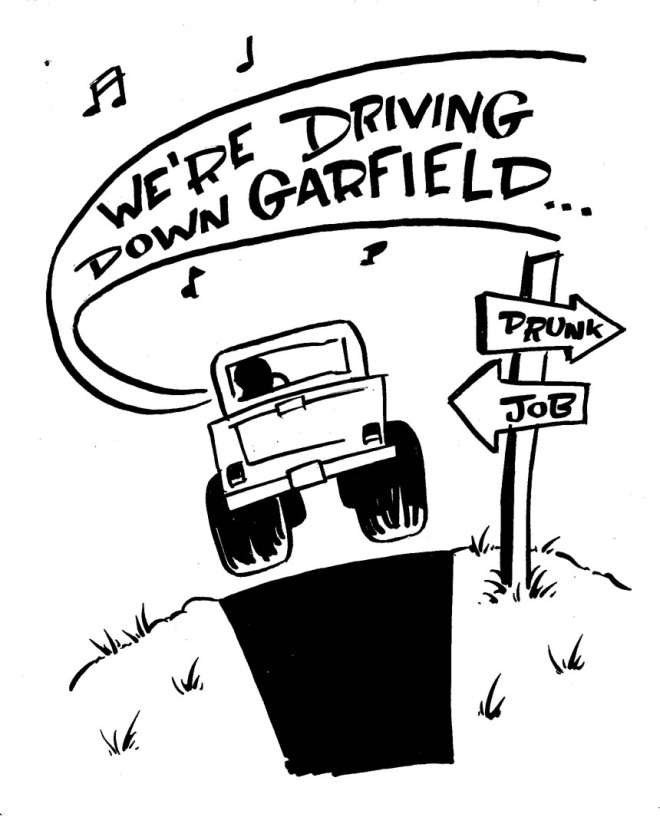A group of senior citizens out on safari descend on the downtown post office. They wear wide brimmed hats—the same kind Curious George’s keeper wore—and huddle together close. One member of the group is clearly the guide. I can tell because he wears a vest and speaks with authority. He points out the post office mural, which was painted in 1936 by a local artist named Gordon Grant. The ceiling of the post office is about sixteen feet high, and the mural takes up the seven feet of wall from the ceiling down. It shows workers engaged in the various industries that drove the economy of this area back in the thirties: they farm; they pack oranges; they work on oil rigs; they operate machines in factories; they load trucks. “Notice,” the tour guide says, “that all the faces of the workers are exactly the same.”
I look up at the mural. What the tour guide says is true if you discount the fact that most of the faces have different noses, different chins, and different hairlines. The hues of their skin varies, also. The faces do all seem to conform to the artist’s style. The eyes and mouths look pretty similar.
The tour guide adds, “And they’re all looking down.” Which, again, is true if you discount the fact that several of them are looking up.
Perhaps because I’ve spent so much time looking at this mural, I start to really pay attention to the tour guide. I turn my gaze from the mural and to the guide. I notice that all the faces of the senior citizens on safari are not the same. While they do wear big hats that protect them from the sun, their faces differ. Some show that loose elasticity of someone pushing or perhaps even beyond eighty. Some stare intently at the mural. Some don’t regard the mural at all, instead checking out the people in line or the homeless dude camping by the front door. The tour guide doesn’t seem to be looking at the painting. His eyes focus inwardly, on a memorized passage about a mural that he doesn’t bother to glance up and see at all. He has a thin, gray beard, slumped shoulders, arched back, and a round belly. If a cartoonist turned him into a character, the tour guide would likely morph into a tortoise.
He says, “Most of all, you’ll notice that the workers all seem unhappy. This is because the artist, Gordon Grant, was a communist. So all the workers are communists. That’s why they’re so unhappy.”
This makes me want to leave the line and ask the guide a few questions. First, if an artist is a communist, does that mean that everyone he paints becomes a communist, too? When Diego Rivera painted Mussolini, a Klansman, and the Pope in one of his murals, did Mussolini, the Klan, and the Pope all become communist? And what about being communists would make the workers unhappy? My understanding of communism—which comes from having actually read The Communist Manifesto—suggests that, under a communist regime, the workers would share equally in the wealth produced by their labor. Wouldn’t that make them happier than the real farm workers of the thirties who were divorced from the wealth of their production, who were frequently beaten or arrested or starved out for attempting to organize, who were paid wages that either barely allowed them to feed themselves or weren’t enough for them to feed themselves?
I don’t walk over to the tour guide to ask him any of these questions. I just keep listening.
“And how did the town react?” the tour guide asks himself. “Well, this was a Republican town. They were not pleased at all with this socialist painting.”
Again, I want to ask questions. What makes a town Republican? Was there some halcyon past when entire towns agreed on a political standpoint? It seems to me that most people don’t wholly endorse one party or another, but pick and choose based on specific issues and candidates and their limited choices in elections. Was that not the case in the thirties? And what did it mean to be a Republican in the thirties? Did the town stand behind Hoover, despite the fact that his policies were part of the reason the nation was flung into the Great Depression, despite the fact that he called upon McArthur to violently suppress World War I veterans who marched on the White House looking for pay that they’d been promised but never received?
And was Grant a communist or a socialist? I know that communism is a socialist platform in the same way that a square is also a rectangle, but just as not all rectangles are squares, not all socialists are communist. The terms are not interchangeable. Communism has, as one of its principle tenets, the abolition of private property. Socialism is simply a community or government project that seeks to enrich the community without turning a profit. The examples of socialism we could see on this safari, for example, are the post office that we’re standing in, the street that runs in front of it, the park across the street from it, and the city-funded tour that the tour guide is leading. So, when the community railed against socialism, did they rail against the post office itself? Did they rail against the public road that led to the post office? What was their united opposition?
The tour guide chuckles as he describes the sad descent the artist, who ended up committing suicide. When he’s done, he leads the safari out of the post office and onto further points of interest.
My poor wife has to hear me ramble about everything wrong with that tour guide’s thirty-second presentation.
Part of what chaps my ass about this tour guide’s presentation is his total dismissal of the painting. I love that painting. I live downtown. I run the mail order of a non-profit book publisher, so I spend a lot of time mailing books at that post office. A lot of that time is spent standing in line. Which makes sense. I live in a heavily-populated region of an overpopulated world. In a lot of cases, more than one member of the population wants to do that same thing at the same time, in the same place. So we have to wait for others sometimes. It’s no big deal. Still, I greatly appreciate Grant’s mural at the post office. It’s a respite from all the advertising clutter that surrounds me. Instead, here’s a piece of art that gives my thoughts a field to roam around in. I like that the art matches the landscape of my life. I love that it focuses on workers—both men and women—in their daily activities. I wish I lived in a society that supported more of this art. I wish that our public spaces would offer more things like Grant’s mural and fewer things like billboards.
I also love that, if you had the time to stare for hours at this mural, you’d probably come up with different ideas about it than I do. We could talk about our different interpretations. All that I ask is that, unlike the tour guide, you actually look up at the painting before generating your ideas. Art is so much better when you actually look at it.
The other thing that bugged me about the tour guide was how much his presentation mirrors our cultural discourse. He works exactly the way that much of our media works. In short, you have someone who knows very little about the issues he’s presenting, has almost no concern with whether the information has any bearing in fact, uses language that he does not have control over, discusses an issue devoid of the context surrounding the issue, and delivers the information in a way that is needlessly simplistic. And, like the rest of the safari, we spend too little time asking questions about the information. Instead, we tend to either accept it because it’s easier to accept the opinions of others than to do the research necessary to form our own opinions, or we get frustrated that so much of our information is delivered by dubious presenters like the tour guide, so we largely tune out. In both cases, we lose opportunities to understand our world better. It’s a shame.
After leaving the post office, my wife and I head into downtown. The safari is now at the corner of Chestnut and Main. The tour guide points at the old downtown theater building. He’s too far away for me to hear what he’s saying, which is lucky for my wife, because that means she won’t have to hear my rebuttal. Our former neighbor Shirley is on a collision course with the group. Shirley lived in the section eight housing that was next to the first apartment my wife and I shared here. She’s crazy. She has some sort of dissociative disorder. Some days, we could hear Shirley screaming at her empty apartment, using the voice of an angry older male. Sometimes, she would pace up and down the stairs, talking to herself in another voice. Sometimes, she sat on the steps and talked like a very young girl. We lived next to Shirley long enough for me to recognize five or six distinct voices she used. One of those voices was of sane Shirley. I’d frequently chat with sane Shirley. Nothing too specific. Just the typical neighbor chat: stuff about the weather or day-to-day activities. One time, she baked me cookies.
Shirley approaches the safari. It’s clear she’s out of it. I can tell by the way she’s charging toward the group like she might sack the tour guide. My wife and I get closer. Shirley charges past the group, then stops to wait for the traffic light. The group heads east toward the library. My wife and I cross Main. Shirley doesn’t recognize us. She doesn’t even react to me when I wave to her. Instead, she cocks her hips and waves her hand at the traffic light with the type of flourish a model uses at a car show. She talks about the traffic light. I can’t make out what she’s saying, but I recognize her teenage girl voice.
We end up following Shirley for a couple of blocks. She keeps up her routine, flourishing her hand at points of interest downtown in her own dissociative mimicry of the tour guide. She points out benches, an ATM machine, an Italian restaurant, a white lady in yoga pants who’s walking a dog. I can’t make out a word Shirley is saying. Still, I think she’s so much better at this than the tour guide.
Author’s note: This is the twenty-fourth chapter to a collection of Razorcake columns I wrote. It originally ran in Razorcake #63. For more information about the collection, read this post. If you enjoy reading my Razorcake columns, please consider subscribing to the magazine.



